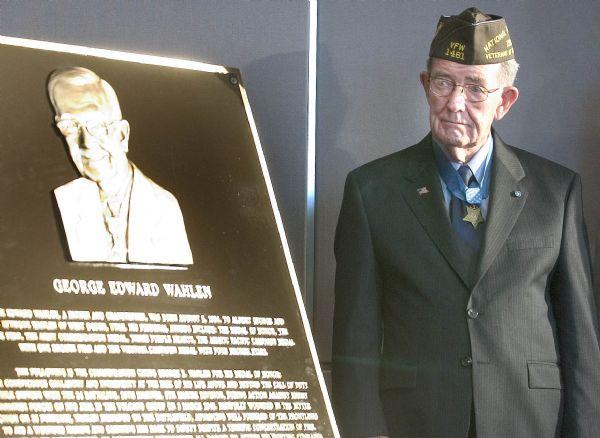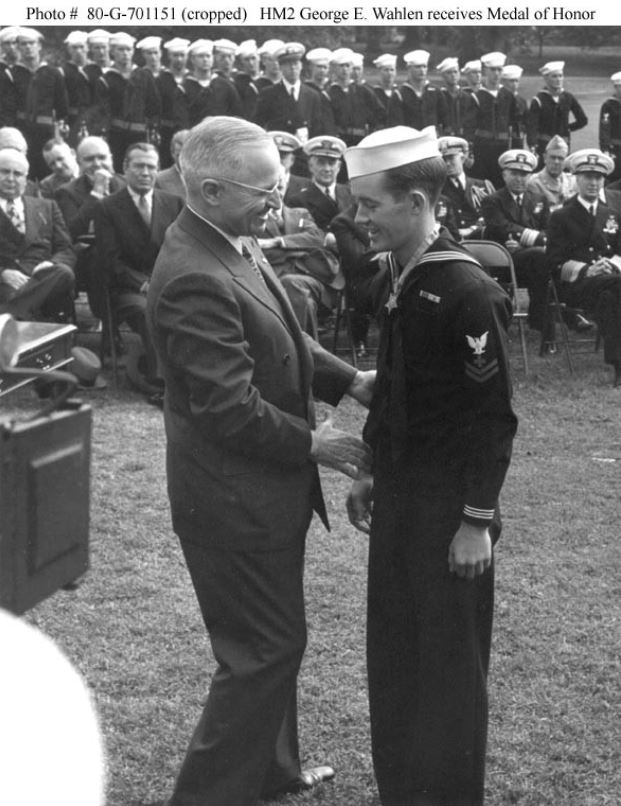George E. Wahlen
George E. Wahlen was a decorated United States Army major who served with the U.S. Navy as a hospital corpsman attached to a Marine Corps rifle company in World War II. He was awarded the Medal of Honor for his service in World War II. He also was honored with three Purple Heart decorations (one earned in Vietnam), a Bronze Star, an Army Commendation Medal, the Asiatic Pacific Campaign Medal with one star, and the Vietnam Service Medal with four campaign stars. He was also presented the Direct Service to Public Award from the Central Office of the Veterans Administration in Washington, DC, and the Weber State College Presidential Citation for service to the veteran students.
Wahlen was born on August 8, 1924, in Ogden, Utah. In 1943, at age 17, he trained as an aircraft mechanic and served at Hill Field near Layton, Utah, He led five other mechanics as crew chief for the U.S. Army Air Corps. He volunteered for the draft, hoping to work on aircraft. On June 11, 1943, he enlisted in the U.S. Naval Reserve as a seaman apprentice. A week later he was on active duty at the Naval Training Station in San Diego, California, where he completed recruit training. On July 20, he advanced to seaman apprentice second class and attended the Naval Hospital Corpsman School in San Diego. He then attended the Naval Hospital Corpsman School in San Diego as seaman apprentice second class. He advanced to seaman apprentice first class on November 1, 1943, after his graduation and was transferred to the Naval Hospital there. He advanced to pharmacist mate third class on December 1 and was assigned to the Field Medical Service School at Camp Elliot, California, for field training. When he completed his training in February 1944, he was assigned to the 2nd Battalion, 26th Marines, 5th Marine Division at Camp Pendleton, California. In July 1944, his division was sent to Hawaii for further training. He advanced to pharmacist mate second class on November 1 and was assigned to Fox Company.
He landed with his unit on Iwo Jima on February 19, 1945. By now, Wahlen was 20 years old and had never seen combat.
U.S. military leaders were prepping for an invasion of Japan and had selected the then-little known island of Iwo Jima, located 600 miles south of Tokyo. Wahlen rushed with his platoon from a beach-landing craft right into machine gun and artillery fire. According to those he treated, Wahlen seemed unconcerned for his own well-being as he set to work tending the wounded. For the next two weeks he often dashed through machine gun fire to reach the wounded. According to the Salt Lake Tribune:
- Trying to reach several injured Marines about a week into the fighting, he came upon a Japanese grenade bunker that was holding U.S. forces at bay. He called to a Marine to throw him a grenade, then crawled to the bunker to kill those inside. Wahlen, hit by grenade fragments, bandaged his own right eye and helped a badly wounded Marine off the deadly hill.
- Several days later, Wahlen was trying to pull a wounded Marine from the lines when a shell landed nearby, hitting him in the shoulder and the back. Wounded once again, he could have been evacuated. he chose to stay.
- The next day Wahlen was headed to an artillery crater to attend to five wounded Marines when a shell landed in their position. A piece of shrapnel struck Wahlen near his right ankle, breaking his leg. “I bandaged myself up, took a shot of morphine and crawled over and started helping a Marine that had both his legs blown off,” he recalled.
- After putting tourniquets on the Marine, Wahlen was too badly injured to continue. The medic was put on a stretcher and evacuated.[1]
Seven months later he received the Medal of Honor from U.S. president Harry S. Truman while he was recovering in a Marine hospital at Camp Pendleton. He was honorably discharged on December 19, 1945.
Several years after he married his wife, Melba, a letter arrived inviting Wahlen to an event with the president at The White House. Until that moment, she hadn’t known that her husband had won the U.S. military’s highest honor for heroism.
Wahlen reenlisted in the U.S. Army in 1948 as a medical technician. he became an officer and served in the Korean War and the Vietnam War. He retired from the Army in 1968 with the rank of major and took a job assisting veterans at Weber State University.
Wahlen preferred his own anonymity during the post-Vietnam era, but he didn’t want those he had served to lake the attention they needed. “As veterans groups sought state funding to improve the Utah Veterans Memorial Cemetery at Camp Williams, they leaned on Whalen’s fame. . . . When the cause was right, Department of Veterans affairs Director Terry Schow said, Wahlen would make an appearance, give a short speech or go shake a few hands on Capitol Hill—all in the name of loosening purse strings for fellow veterans.”[2] In his remarks he usually said nothing about his own service on Iwo Jima. He believed he just represented the veterans.
- "The way George always rationalized in his mind, he was a symbol for all of the other veterans," said Gary Toyn, who wrote about Wahlen's war experiences in the biography Quiet Hero . "He got all the attention, and he never liked that, but he understood that he had a role to play. At one point he realized, 'You know, I can really do some good with this.' And that's how he continued to serve."
In 2004, U.S. president George W. Bush signed legislation authorizing the naming of the George E. Wahlen Department of Veterans Affairs Medical Center in Salt Lake City. Since federal buildings cannot bear the name of a living person, Congress approved special legislation allowing for an exemption in Wahlen’s case.
A veterans’ nursing home in Ogden, Utah, which opened in January 2010, was named in his honor. A city park in Roy, Utah, is named after George E. Wahlen.
Wahlen and his wife, Melba, were the parents of five children. He had received an associate’s degree from Weber State College, a Bachelor of Science degree (magna cum laude) from the [[BYU-Hawaii|Church College of Hawaii], and had completed two years of graduate study at the University of Utah. He was a member of The Church of Jesus Christ of Latter-day Saints.
Wahlen died on June 5, 2009 at the age of 84. He had been Utah’s last living Medal of Honor recipient.
Whalen’s citation reads:
- The President of the United States in the name of The Congress takes pleasure in presenting the MEDAL OF HONOR to
- HOSPITAL CORPSMAN SECOND CLASS GEORGE E. WAHLEN
- UNITED STATES NAVY RESERVE
- for service as set forth in the following CITATION:
- For conspicuous gallantry and intrepidity at the risk of his life above and beyond the call of duty while serving with the 2d Battalion, 26th Marines, 5th Marine Division, during action against enemy Japanese forces on Iwo Jima in the Volcano group on 3 March 1945. Painfully wounded in the bitter action on 26 February, Wahlen remained on the battlefield, advancing well forward of the frontlines to aid a wounded marine and carrying him back to safety despite a terrific concentration of fire. Tireless in his ministrations, he consistently disregarded all danger to attend his fighting comrades as they fell under the devastating rain of shrapnel and bullets, and rendered prompt assistance to various elements of his combat group as required. When an adjacent platoon suffered heavy casualties, he defied the continuous pounding of heavy mortars and deadly fire of enemy rifles to care for the wounded, working rapidly in an area swept by constant fire and treating 14 casualties before returning to his own platoon. Wounded again on 2 March, he gallantly refused evacuation, moving out with his company the following day in a furious assault across 600 yards of open terrain and repeatedly rendering medical aid while exposed to the blasting fury of powerful Japanese guns. Stouthearted and indomitable, he persevered in his determined efforts as his unit waged fierce battle and, unable to walk after sustaining a third agonizing wound, resolutely crawled 50 yards to administer first aid to still another fallen fighter. By his dauntless fortitude and valor, Wahlen served as a constant inspiration and contributed vitally to the high morale of his company during critical phases of this strategically important engagement. His heroic spirit of self-sacrifice in the face of overwhelming enemy fire upheld the highest traditions of the U.S. Naval Service.[4]
- Harry S. Truman

